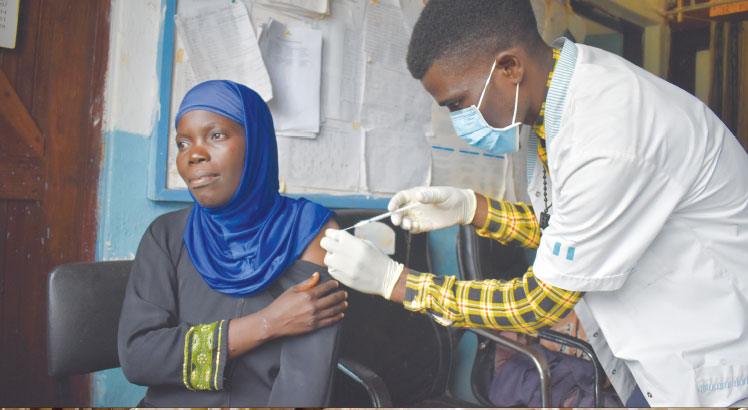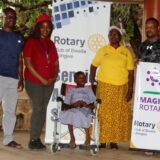To kick-start the 16 Days of Activism Against Gender-Based Violence (GBV), our Staff Writer JAMES CHAVULa highlights how expanding outpatient services in public health centres helps survivors access treatment and justices with ease.
Amina Hassan, 36, wanted to become a nurse and inspire the youth in rural settings to dare dream big.
She grew up in Mzenga, a hilly tea-growing setting in Nkhata Bay where health workers are few and many girls fall pregnant by their 18th birthday.
However, Hassan married at the age of 15, just after passing Primary School Leaving Certificate of Education examinations.
She narrates: “Since I could read and write, my father told me that going to secondary school was a waste of money.
“I was so devastated that I decided to marry a tailor who took me to Mzuzu City, but our memorable years were short-lived.”
Ngoma gives Hassan a family planning jab
Hassan’s years to forget started shortly after the birth of her second child when her husband reportedly started sleeping out, claiming to guard their shop. However, the worst came when she followed him to the shop around midnight.
She recounts: “Once he disappeared, he would return two or three days later. If I asked, he would slap me in the face.
“When I followed him, he was nowhere in sight. I waited for hours. Then I met him on the way home. He fumed and dragged me home, where he smashed his head into my face with all his might.”
Hassan survived with shaky teeth and a scar on her left eyebrow.
“The jaw still aches today,” she states. “But after being head-butted, I went to Mapale Health Centre in Mzuzu and lied that I had hit a wall in the dark because I didn’t want my children to suffer if their breadwinner got arrested.”
Two days later, Hassan and her children fled to her parent’s home in Mzenga, where she sought treatment at Mzenga Health Centre.
She explains: “A health worker in the outpatient section gave me a warm welcome and looked at my wounded face and swellings. He encouraged me to speak up because GBV is a crime.
“He then referred me to a one-stop centre where I met a police officer and a counsellor for psychosocial support.”
Hassan felt relieved to access various services in one place.
Unicef is supporting the Government of Malawi to integrate GBV, HIV treatment as well as sexual and reproductive health (SRH) services in healthcare provision.
Hassan observes: “Expanding services offered in one place helped me break the silence without fear or shame. You can walk in any time and no one will know the service you want. Previously, we used to skip days dedicated to HIV services or family planning due to fear of onlookers.”
Currently, health workers no longer set special days for each service.
Nkhata Bay District SRH coordinator Khumbo Nyasulu says putting GBV issues in the mix encourages victims to get the necessary support, including justice.
He explains: “Currently, all 21 facilities in the district now attend to victims of GBV, including sexual violence.
“As service providers, we are happy that people such as Hassan now access these important services instead of suffering in silence. Integrated health services also help prevent unplanned pregnancies and sexually transmitted infections, including HIV.”
Emmanuel Ngoma, a medical assistant in charge of Mzenga Health Centre, supports GBV victims as part of integrated health services in the outpatient department, at the one-stop centre and during the mobile clinics.
“While providing family planning and other everyday services, I meet GBV cases that once went unreported. In our cultural setting, most cases are concealed since they involve people who are supposed to support or protect the victims,” he says.
Ngoma says wife battering, property grabbing and sexual attacks remain the most common forms of violence detected in the hilly setting.
Recently, he assisted a 13-year-old girl defiled by a tea grower, currently on the run.
“Our work is nothing if communities continue to conceal cases or help perpetrators escape. Justice is not done,” Ngoma asserts.
To confront the setback, Hassan has become a foot soldier at war with GBV. She discusses the ills of all forms of violence with her neighbours and swiftly reports emerging cases to relevant authorities, including the police.
“I know the pain GBV inflicts on voiceless women and girls, so I help them to speak up because no one has to go through what I endured,” she says.
In June, a 14-year-old girl was raped by her drunken uncle, who enticed her with biscuits and threatened to kill her if she revealed the crime. Hassan took her to the one-stop centre for assistance.
She explains: “After check-ups confirmed defilement had occurred, health workers gave her drugs to prevent a pregnancy and HIV infection.
They also produced a report to be submitted in court when the suspect, who escaped to Tanzania, is captured.”
Apart from helping GBV victims get assisted, Hassan returns to the rural health facility every three months to receive an injectable family planning method.
Nyasulu says it is amazing that the woman, who has since remarried, has become a champion against GBV.
He says: “It is interesting Hassan is speaking up on behalf of girls and women at risk of GBV.
“Her work encourages victims to open up and seek treatment within her community.”
The post Health workers tackle GBV appeared first on The Nation Online.
 Moni Malawi
Moni Malawi 

